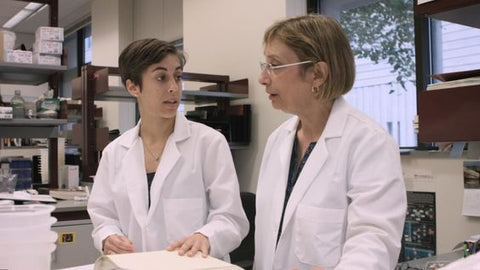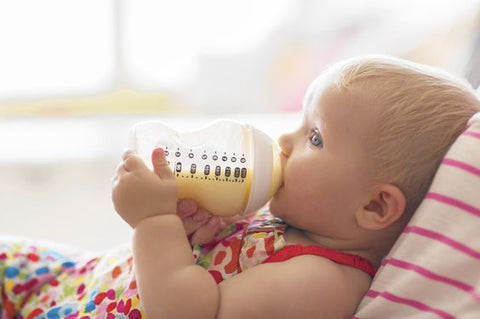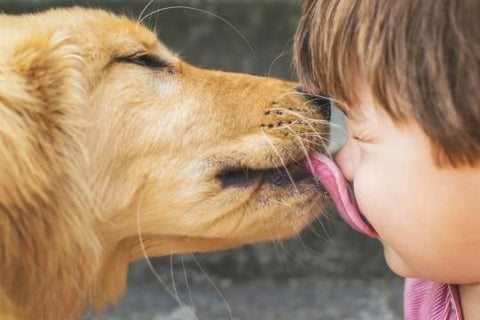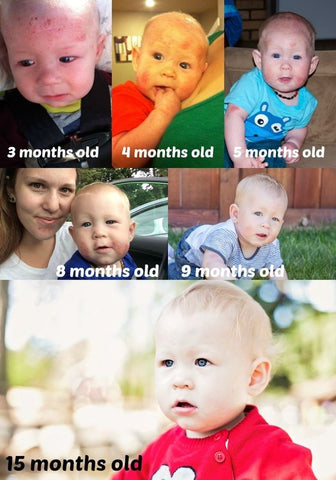What to Do if You Suspect Your Child Has Allergies? How serious is this?
By: My Cutie Pie

Allergies should not be ignored; not only is the child suffering discomfort, but children with allergies that are not treated are more prone to developing ear infections, asthma, and sinus infections, in addition to possibly being at risk of going into shock if the allergies become very severe.
If you suspect allergies are to blame for your infant's sniffling, sneezing, coughing, or rashes, request that your doctor connects you with a specialized allergist so that your baby can take a skin test designed to detect reactions to a host of common allergens.
As a final note, allergies often change as children get older, so if your baby's symptoms recur or get more persistent, it's advisable to take him or her back for another allergy test if over 6 months have elapsed since the last one.
That's not all.
How to Treat Allergies in Babies
Once you have had your little one tested and know what, exactly, is causing his or her allergies, the next step is to figure out how to treat them.
This can be difficult as infants must be handled very delicately where medication is concerned, but with the right approach—involving the correct balance between treatment and prevention—it's possible to provide your baby with some much-needed relief.

Now this is SERIOUS - How to Prevent Allergies
As the old saying goes, an ounce of prevention is worth a pound of cure; while it's likely that if allergies run in your family, your baby will also be affected by them, there are still measures you can take to help your child avoid allergies:
Breastfeed your baby for at least six months. This both strengthens the infant's immune system (allergies are in essence an issue of the immune system, so this is important) and helps your baby to avoid foods that may be potential allergy triggers.
If you do feed your baby formula, you should try to avoid allergenic ingredients, including milk, eggs, fish, and nuts during this time.
Look for a special hypoallergenic protein hydrolysate formula if your baby is showing signs of food allergies and you cannot breastfeed.

-Don't allow smoking in your home. Smoking makes children more prone to a number of respiratory issues, worsening the symptoms of allergies.
-Use dust-mite-proof mattress covers and pillowcases. Dust mites are one of the most common causes of allergies in infants and adults alike, so keeping them at bay is a must.
-Clean regularly. Keeping a very clean home will decrease the amount of dust, mold, and pollen in your home.
-Avoid carpeting. Carpeting absorbs and traps all manner of allergens, and frequent vacuuming will not remove all of them.
-Get rid of feather pillows and down blankets.
-Switch to a hypoallergenic laundry detergent.
-If you do not have a pet, avoid getting one.

Sometimes allergy test results are difficult to interpret in babies because their immune systems are still immature, but even if you cannot pinpoint the exact cause of your child's allergies, the above preventative measures should help through taking care of all of the most common allergens.
Treating Your Baby's Symptoms
If, after taking all of the measures above, your baby is still experiencing symptoms, there are measures you can take to soothe them:
-If your baby has an allergic rash (one of the most common symptoms infants experience), try hypoallergenic skin moisturizers or a 1 percent hydrocortisone cream (which is specially formulated to treat eczema and other allergic rashes).
-Try a baby-safe oral antihistamine, if your baby is old enough. Fortunately, the Food and Drug Administration has recently approved the prescription antihistamine Zyrtec for allergies in infants as young as 6 months old, and this medication can be safely used all year long.
While these treatments help, it's still best to work on isolating what is causing the allergy and eliminating it—often babies who are removed from the allergen causing their issues will go on to have less severe allergies in adulthood, and some even recover from the allergy altogether.
We recommend you to consult your doctor and get the best advice.
Read more about allergies -
HOW ALLERGIES ARE CAUSED AND HOW TO TREAT NATURALLY | SHOCKING EXPERT ADVICE Click here.


0 comments